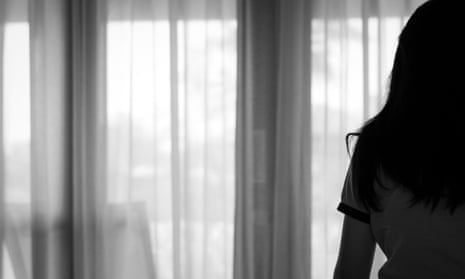I dropped my daughter off at school, but I wasn’t leaving. I was pacing. Hovering. Snatching whatever conversation I could with other parents – mothers, really – the ones who hadn’t already pulled their children out of school. I wanted to only talk about what all the others could only talk about: Covid. Do children really not get sick? Will the supply chain hold up? Is your work OK? What’s happening in China? Italy, the country, has locked down! Should we take the children out? Will you take the children out? What are you going to do? It was 23 March 2020.
Later that morning the then New South Wales premier, Gladys Berejiklian, announced that parents and carers should keep their children home from school wherever possible. That was it. That’s what we were going to do. I went to Kmart and bought stationery – new scrap paper, coloured pads, pipe cleaners. OK. Let’s go.
Nearly two years later, at 3pm on a Friday afternoon, my phone rang. My youngest, at daycare, had a temperature pushing 39C. We collected her, my partner held her defiant head against his chest as he gave her a RAT (negative) and we looked at each other. Is it?
That night she woke, whimpering and feverish, and climbed into our bed as she always does when she’s sick. I didn’t sleep as I watched her belly, hot to the touch, rise and fall and kept replacing the folded-up wet face washer on her forehead. I held her hand and breathed her exhalation. Two mornings later, she and her sister tested positive for Covid. OK, I thought. Let’s go.
We ordered stationery online – new scrap paper. Less paper though, this time, because we would only be in isolation for a week. I knew the things to do. We had done it before.
We have all done it before. I had managed through weeks upon weeks of simultaneous home learning, working and childcare. I had all the strategies – I’d written a bloody guide on it. I’d made posters of activities the children could take to whenever they were bored. I’d made calendars studded with locked down family “events” to break up the weeks. I’d scheduled Friday night drinks and trivia with friends and family. I knew to exercise and stay connected to friends. And Lego – we had so much Lego now. I knew what to do. I’d done it before. I’d done it for longer.
But this was different.
On day three of those seven days, I was on the phone to someone – I can’t remember who. There was noise, maybe chaos, in the background, my partner was sick and was holing up in a single bed in the playroom. I’d been working.
“And how are you doing?” she asked.
“I’m fine,” I replied, but as I spoke I was startled: my voice cracked. Instantly, involuntarily, a wet heat fired at the base of my eyes.
What was that? Of course I’m fine. This is just seven days. Seven days. I am fine. I’ve done it before.
But I was not fine. In this totally fine, totally temporary half life of isolation, what had been held together during all those months of lockdowns was coming apart.
“This feels worse,” I texted friends who had gone through it. “It is worse,” they replied. We could not work out why. What was different about this shorter, totally fine lockdown? Why was it this – this stupid single week – that was breaking us?
“It’s the endlessness of it all. That’s what’s really biting,” says professor Jayashri Kulkarni, an expert in women’s mental health and director of the Monash Alfred Psychiatry Research Centre. “People are saying: ‘Where’s the end point?’
“Covid keeps delivering another whammy,” she says, as Omicron tears through schools, case numbers increase again and the smoke of a new variant rises beyond the horizon. “A lot of anxiety is getting worse, and women feel it worse.”
This isn’t news. A study from the pandemic’s first year, in Victoria, found that 79% of women reported a decline in their mental health, compared with 52% of men. A 2021 report from the Women’s Mental Health Alliance, again in Victoria, found that there had been further increase in women’s mental distress during the second lockdown. Earlier this month, the World Health Organization reported that in the first year of Covid, anxiety and depression had increased worldwide by 25% – and that women and young people, as well as those with pre-existing conditions, were most badly affected.
This latest bout of isolation brought with it a new frontier of exhaustion. Prof Kulkarni says it is those additional caring roles that women take on for older relatives and children, the informal healthcare they provide in the home which adds up; they are the ones who figure out how to keep this child away from that one, what symptoms are severe enough to keep a child home from school and soothes their seven-year-old’s terror when the positive line appears on their test. “Again and again, women are tested,” says Kulkarni. The women are exhausted.
It affects everyone, of course. Those who have experienced hotel quarantine or the harshest of lockdown restrictions will know better than most; it is the tenor of isolation itself which presents the challenge. Going through it alone, without the camaraderie of a community lockdown. It is the relinquishing of control over your activities. It is the absence of the outdoors, even for a short walk. It is the threat of infection, the toll of the sickness the virus induces itself which weighs those seven days down so heavily.
This is not an argument against isolation periods, so clearly vital to managing the virus. It is an acknowledgment, nearly two years to the day that children were told to stay away from school and our worlds changed forever, that even though we call it Covid-normal, it isn’t. And for some of us, all that exhaustion and not-normality, can come to a head in an innocuous seven days at home.
But it ends. On our release, on a drizzly Sunday morning, I held my daughters’ hands as we walked out of the house to get breakfast. As I did I felt the weight of the building lift off me, brick by beam. It ends, it ends.

